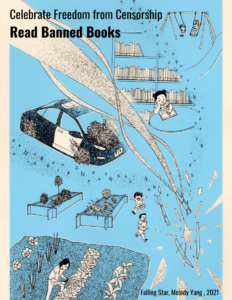Freedom to Read Under Attack
 Banned Books Week, an annual celebration of the freedom to read, will be held September 18–24 this year. During this week, authors, booksellers, librarians, publishers, and readers come together to advocate for the right to read without censorship. The theme for 2022 is “Books Unite Us. Censorship Divides Us.”
Banned Books Week, an annual celebration of the freedom to read, will be held September 18–24 this year. During this week, authors, booksellers, librarians, publishers, and readers come together to advocate for the right to read without censorship. The theme for 2022 is “Books Unite Us. Censorship Divides Us.”
Free and open access to ideas and information is a critical element of our democracy. The observation of Banned Books Week pushes back against censors: people who try to remove or restrict access to books that they find threatening in some way.
Book challenges often come from parents who want to restrict access to materials they find offensive. They want to control what their children, and their neighbors’ children, can read in school classrooms and public libraries. Targets are often books by or about Black or LGBTQ people. Censors label these books as “obscene” or “harmful to minors” or even as tools for “grooming” children for exploitation. For example, the Proud Boys protesting at Drag Queen storytimes claim to be protecting children from the corrupting influence of fairy tales and glitter.
Unfortunately, the intense political polarization of the past several years has resulted in an increase in censorship activity. Attempts to remove books from libraries, and attacks on librarians, are on the rise. According to the American Library Association, the number of banned and challenged books doubled from 2020 to 2021, reaching the highest number since tracking began. There were more than 729 attempted bans of 1,597 individual books in 2021.
Another disturbing trend is that more states are passing legislation to ban books and to restrict what librarians and K-12 teachers can add to their reading lists and book collections. In states where these new laws are in effect, educators who attempt to share banned materials or even talk about bans are being harassed and threatened. Banned Books Week 2022 is an opportunity to applaud those who stand up for our freedom to read, even at a cost to themselves.
For more information on book banning and censorship:
“How Efforts to Ban Books Impact Public Libraries” Discussed on WNYC’s “The Takeaway”
Book Bans? My School Doesn’t Even Have a Library (Opinion)
Top 10 Most Challenged Books of 2021
The ALA Office for Intellectual Freedom tracked 729 challenges to library, school, and university materials and services in 2021. Of the 1597 books that were targeted, here are the most challenged, along with the reasons cited for censoring the books:
- Gender Queer by Maia Kobabe Reasons: Banned, challenged, and restricted for LGBTQIA+ content, and because it was considered to have sexually explicit images
- Lawn Boy by Jonathan Evison Reasons: Banned and challenged for LGBTQIA+ content and because it was considered to be sexually explicit
- All Boys Aren’t Blue by George M. Johnson Reasons: Banned and challenged for LGBTQIA+ content, profanity, and because it was considered to be sexually explicit
- Out of Darkness by Ashley Hope Perez Reasons: Banned, challenged, and restricted for depictions of abuse and because it was considered to be sexually explicit
- The Hate U Give by Angie Thomas Reasons: Banned and challenged for profanity, violence, and because it was thought to promote an anti-police message and indoctrination of a social agenda
- The Absolutely True Diary of a Part-Time Indian by Sherman Alexie Reasons: Banned and challenged for profanity, sexual references and use of a derogatory term
- Me and Earl and the Dying Girl by Jesse Andrews Reasons: Banned and challenged because it was considered sexually explicit and degrading to women
- The Bluest Eye by Toni Morrison Reasons: Banned and challenged because it depicts child sexual abuse and was considered sexually explicit
- This Book is Gay by Juno Dawson Reasons: Banned, challenged, relocated, and restricted for providing sexual education and LGBTQIA+ content.
- Beyond Magenta by Susan Kuklin Reasons: Banned and challenged for LGBTQIA+ content and because it was considered to be sexually explicit
If you want to read a banned or challenged book (including some of the ones listed above) and see what all the controversy is about, check out our display in the front area of the library!
This post was co-authored by Rachel Jones and Nora Almeida




